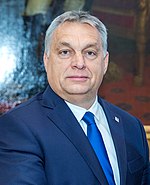Viktor Orbán, Date of Birth, Place of Birth
TweetViktor Orbán
Hungarian politician, chairman of Fidesz
 Date of Birth: 31-May-1963
Date of Birth: 31-May-1963
 Place of Birth: Székesfehérvár, Fejér County, Hungary
Place of Birth: Székesfehérvár, Fejér County, Hungary
Profession: lawyer, politician, jurist, association football player
Nationality: Hungary
Zodiac Sign: Gemini 
Viktor_Orban
orbanviktor
About Viktor Orbán
- Viktor Mihály Orbán (Hungarian: ['viktor 'orba?n] (listen); born 31 May 1963) is a Hungarian politician who has been Prime Minister of Hungary since 2010; he was also Prime Minister from 1998 to 2002.
- He has also been President of Fidesz, a national conservative political party, since 1993, with a brief break between 2000 and 2003. Born in Székesfehérvár, Orbán studied law at Eötvös Loránd University, graduating in 1987.
- He briefly studied political science at Pembroke College, Oxford, before returning to Hungary to enter politics in the wake of the Autumn of Nations.
- He became head of the reformist student movement the Alliance of Young Democrats (Fiatal Demokraták Szövetsége), which would eventually become the Fidesz party.
- Orbán became a nationally known politician after giving an address at the 1989 reburial of Imre Nagy and other martyrs of the 1956 revolution, in which he openly demanded that Soviet troops withdraw from the country. After the transition to democracy in 1990, he was elected to the National Assembly and served as the leader of Fidesz's parliamentary caucus until 1993.
- Under his leadership, Fidesz shifted away from its original centre-right, classical liberal, pro-European integration platform toward more right-wing national conservatism.
- After Fidesz won a plurality of seats in the 1998 election, Orbán was appointed Prime Minister for the first time. Fidesz narrowly lost the 2002 and 2006 elections to the Socialist Party, with Orbán spending this period as Leader of the Opposition.
- The fall in popularity of the Socialists, exacerbated by Prime Minister Ferenc Gyurcsány's "Oszöd speech", helped Orbán lead Fidesz to a landslide victory in 2010.
- Orbán formed a coalition with the Christian Democrats, giving him a supermajority in the National Assembly, which he used to introduce major constitutional and legislative reforms.
- Fidesz retained its supermajority in the 2014 and 2018 elections. Orbán's social conservatism, national conservatism, soft Euroscepticism and advocacy of what he describes as an "illiberal state" have attracted significant international attention.
- During his time in government since 2010, Hungary has experienced democratic backsliding, shifting towards authoritarianism.In August 2018, Orbán became the second longest-serving Prime Minister after Kálmán Tisza.
Read more at Wikipedia
See Also
- Famous People's Birthdays on 31 May, Hungary
- Famous People's Birthdays in May, Hungary
- Famous lawyer's Birthdays on 31 May, Hungary
- Famous lawyer's Birthdays in May, Hungary
- Famous politician's Birthdays on 31 May, Hungary
- Famous politician's Birthdays in May, Hungary
- Famous jurist's Birthdays on 31 May, Hungary
- Famous jurist's Birthdays in May, Hungary
- Famous association football player's Birthdays on 31 May, Hungary
- Famous association football player's Birthdays in May, Hungary

